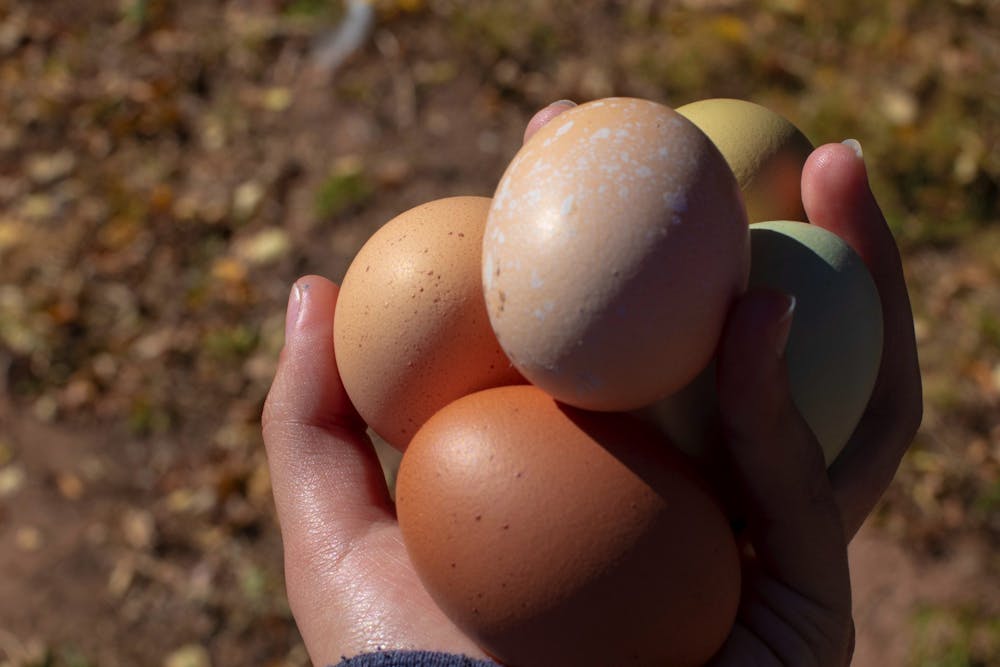While 100% sustainability may be the long-term goal for some environmental activists, Santa Fe locals Kim Brown and Melissa Willis are far more interested in making a change with the land they have at their feet.
As human beings, sustainability is more crucial than ever with increased climate change occurring over the last century. For some people, total sustainability is the overall goal. The thing about being human is that 100% sustainability isn’t 100% realistic — ever.
People can not go without the convenience of their everyday routine. The farfetched idea of farming and small agriculture seems out of reach for most, but Brown and Willis are the exceptions, embracing the challenge of living their version of a sustainable life.
The couple lives on and maintains 10 acres of farmland in the small village of Villanueva, New Mexico. For them, owning a small farm is one of the ways they aim to reach a sustainable lifestyle.
At their self proclaimed Evergrowing Farm, they are working to be realistically sustainable as they grow vegetables, fruits and other large crops on their rented property — as well as raise over five kinds of farm animals.
The couple took on the challenges of maintaining a small farm after spending some years making a DIY urban farm, where they began their agricultural journey. After several feats of learning and growth, two moves and time spent finding the right fit for their family, Willis and Brown took on the role of caretakers in Villanueva — two hours from their everyday lives in Santa Fe.
In October, I spent a day with Brown and Willis at their farm and got to see all that they care for on the land. Even as someone who tries to be as environmentally aware as I can, I went to the Evergrowing Farm completely ignorant about the effort that goes into farming — even a small one.
Willis and Brown spend hours every week feeding their goats, pigs, hens, ducks and turkeys, as well as harvesting eggs, fruits and vegetables. That comes after caring for the soil, throwing down mulch and keeping the ground clear of any unwanted pests (without pesticides). They pull water from an acequia for their gardens, animals and their orchards.
Brown uses a tractor to turn the soil when needed, and the two rely on the animals to graze and fertilize their land. Typically Brown and Willis will go full circle by raising some animals for butcher or other reasons, like breeding purposes, or having milk and eggs.
The entire time they taught me about what they do on a day to day — week to week basis — I couldn’t help but notice how stunning all the life is that is growing on the farm.
We collected colorful eggs from the chicken coop. We toured around a rafter of red, white and blue turkeys. The slow browning of autumn mixed with the green of the leaves reflected beautifully with the sun. We munched on crunchy, fresh-picked apples and listened to the goats' bleat while we took in the mesa views that surround the small village.
That much beauty makes any challenges bearable, but those challenges do not go overlooked when it comes to farming. It takes a lot of time, money and energy to keep up with the farm work, but Brown and Willis do it happily. They see the payoff as worth the work.
Get content from The Daily Lobo delivered to your inbox
The deal they’ve made with their current landlord is as follows: When it comes to orchards, the landowner keeps 30% of what is harvested, while Willis and Brown keep the remaining 70%. Whatever else the couple wants to grow or raise is 100% their own.
Pretty sweet deal, right?
Well, it didn’t come by pure luck. The couple has chosen a kind of lifestyle that requires sacrifice, drawing a clear line between what they want and what they need and staying active in online communities dedicated to small farm agriculture.
I followed them around their farm home in awe of how committed they are to nurturing their land, all while raising Ember, the couple’s six-year-old daughter.
Willis and Brown told me that although the commute can be taxing for both them and Ember, they’ve noticed that she is being raised with skills and insight that her peers don’t have because of the valuable lessons a child can experience on a rural farm.
Going back to the idea of sustainability, Willis spoke to me about their personal goal to reduce their carbon footprint and hope their farming practices contribute to reducing that footprint, along with their choice to buy local and remain educated about the growing issue of climate change.
Willis and Brown told me that although they understand they will not be able to reach total sustainability, they’re doing their best to tread lightly on the planet and hopefully leave it a better place for future generations.
Alanie Rael is the sports editor at the Daily Lobo. She can be contacted at sports@dailylobo.com or on Twitter @AllyRael






